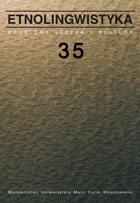What does the Internet tell the linguist about American democracy?
What does the Internet tell the linguist about American democracy?
Author(s): Alena RudenkaSubject(s): Language studies, Media studies, Communication studies, Lexis, Semantics, Government/Political systems, Philology
Published by: Wydawnictwo Naukowe Uniwersytetu Marii Curie-Sklodowskiej
Keywords: cultural concept; linguistic worldview; Internet; democracy; the USA;
Summary/Abstract: This article presents the results of a study of the cultural concept of democracy in American English, mainly in its contemporary usage (20th and 21st centuries). It investigates data from online dictionaries and other sources on the semantics of the lexemes democracy, democrat, democratic, and their systemic characteristics, as well as data from an associative dictionary. Examples are taken from COCA (Corpus of Contemporary American English) and COHA (Corpus of Historical American English). The concept closest to democracy is freedom. However, in contrast to freedom, democracy is a non-personal concept and totally belongs to the socio-political system. This is what emerges from the use of the word democracy (and related words) in all discourse types. Citizens of the United States generally value democracy highly as a political. Americans are proud of the level of democracy in their country, although this assessment may vary. In the linguistic worldview of US residents, the concept of democracy is represented through oppositions: 1) positive/negative attitude towards democracy as a type of political system; 2) “good”/”bad” (“insufficient” or “excessive”) democracy; 3) ideal/real democracy. Currently, American society is highly polarized along party lines, and any contradiction “fits” into the conceptual grid of its two-party system associated with democratic (liberal) vs. republican (conservative) views.
Journal: Etnolingwistyka. Problemy Języka I Kultury
- Issue Year: 35/2023
- Issue No: 35
- Page Range: 261-281
- Page Count: 21
- Language: English

